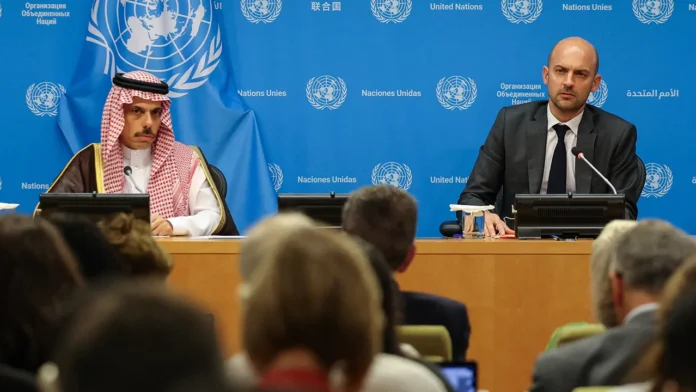Landmark Shift in Arab Diplomacy
Arab countries joined forces this week to call on Hamas to disarm and exit Gaza. Qatar, Saudi Arabia and Egypt stood with 14 other nations in signing a joint declaration at a United Nations meeting on the two-state solution. And this marks the first time these Arab capitals have formally taken aim at Hamas after its October 7, 2023 attacks on Israel.
The gathering drew the full Arab League and the European Union behind a seven-page statement that says Hamas must hand over its weapons to the Palestinian Authority and end its rule in Gaza in order to make way for a sovereign Palestinian state.
Conference Details and Aims

France and Saudi Arabia co-hosted the event. They brought together 17 countries plus the Arab League and the EU to back the declaration. The plan calls for a temporary UN mission to help secure Gaza once fighting ends. Some nations have said they would send troops. Britain and France have also said they will recognize a Palestinian state by September if Israel agrees to a ceasefire and other terms.
British Prime Minister Keir Starmer said his country would act if Israel allows more aid into Gaza, halts settlement work in the West Bank, and commits to peace talks within two months.
Key Players Stay Away

Neither Israel nor the United States took part in the conference. Israeli Prime Minister Benjamin Netanyahu has said that a two-state deal would threaten security, and the U.S. State Department called the meeting “unproductive and ill-timed” and “a reward for terrorism,” according to algemeiner.com. And this lack of support from Washington and Jerusalem shows the gap between regional aims and U.S. policy.
Human Cost Drives Action
Meanwhile, Gaza faces a deepening humanitarian crisis. UN officials say nearly half a million people now live in famine-like conditions after almost two years of conflict. And that urgent need for relief was on full display at the UN session. Aid groups have warned that the longer fighting drags on, the worse the crisis will grow.
What Comes Next
The joint declaration lays out clear steps. First, Hamas must step aside and give up its arms. Then the Palestinian Authority would step in to govern with backing from the UN and other states. And some countries have already said they will help with security, aid and rebuilding. But Israel’s refusal to join the talks and the U.S. opposition leave big questions about how to move forward.
Personal Analysis
I see this as a bold move by Arab capitals that could reshape the path to peace if followed by real action. And calling for Hamas to step aside shows a shift in regional politics toward pragmatism. But the absence of Israel and the United States at the table casts doubt on the plan’s impact. And without buy-in from all sides, it risks staying a paper promise rather than a step toward lasting calm.
Sources: timesofisrael.com

